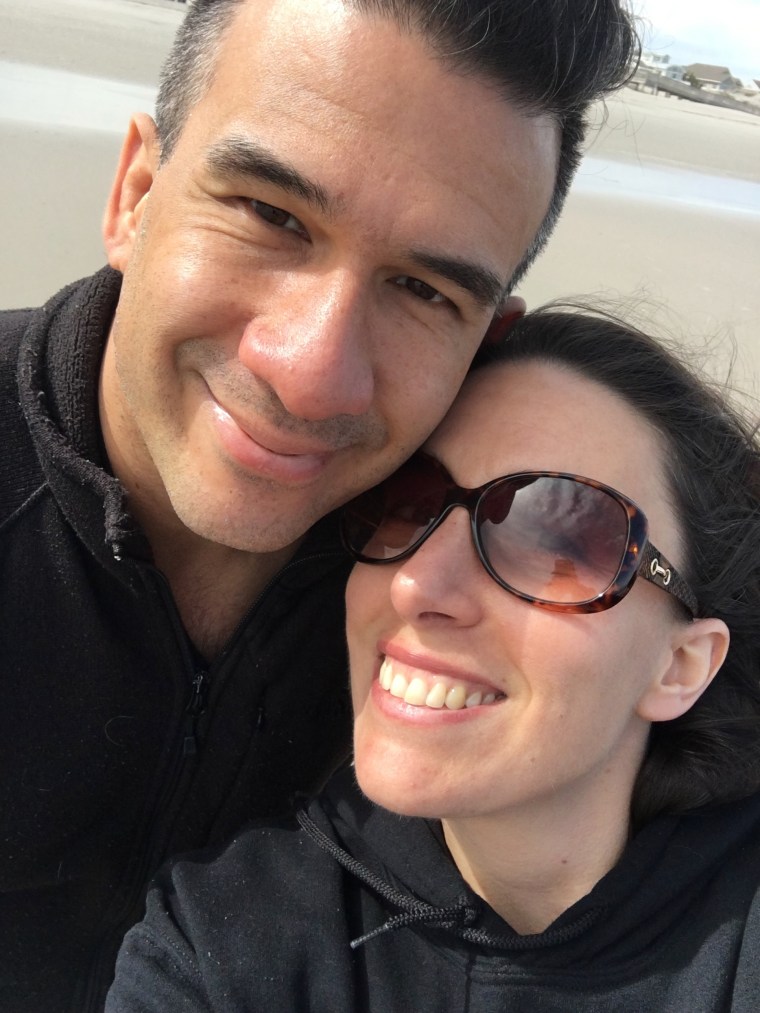For years, when married couple Mary and Jason Wise would have a disagreement, it would turn into a heated argument and “a storm would rage,” according to Mary Wise, a nurse who lives outside Philadelphia,
A big part of the problem, she says, was that they didn’t know how to listen.
The pair loved each other, and their fights were never physical, says Wise, a writer who blogs regularly about relationships on Medium.com — but she says the marriage had become dysfunctional.
“I just kept feeling like I can’t keep living like this, and it had to do with me not being able to say what I felt like I needed to say in our relationship, and it had to do with feeling as though he wasn’t able to hear it, and I also wasn’t able to hear him,” Wise tells NBC News BETTER.
The couple, who met in 1997 and married in 2000, began seeing a marriage counselor in 2013. Wise says he taught them about “active listening,” a communication method that requires each person in a relationship to fully focus on, understand, and repeat back what the other partner is saying.
“I feel” statements

Wise says the therapist sat them down and instructed them to speak to one another using “I feel” statements.
According to this technique, “I feel” statements help the listener focus on the way you feel. In contrast, statements that begin with “you” can come across as accusatory, which may put the listener on the defensive. For example: “You didn’t wash the dishes!”
But when you communicate instead with “I feel” statements, you give your partner an opportunity to understand why their behavior is negatively impacting you. “I feel overwhelmed with having to wash the dishes every night because it really cuts into my free time.”
Listen and repeat
Wise says she and Jason took turns talking to each other using “I feel” statements.
When she spoke, Jason was not allowed to speak. He had to listen to every word she said and then repeat it back to show her that he had listened.
When she was finished speaking, it was her turn to listen to him and repeat back everything that he said.
“It was this back and forth that was very controlled,” says Wise, “and it sort of slowed us down and gave us the ability to listen.”
Ask: “What did I just say?”
Mary and Jason began using active listening regularly to prevent heated arguments — by stopping and listening to each other before a disagreement got out of control, says Wise.
She says they still have their disagreements, but have stopped blowing up at each other.
“I could say to him now — and he’ll hear it — ‘I feel like I’m not being listened to and it’s hurting my feelings — I need you to tell me what you heard. I need you to repeat back to me everything that you’ve heard me say so I can feel like you actually heard me,’” she says. “And a lot of times he’ll say, ‘I don’t know what you said,’ because he really wasn’t listening, because he was getting heated, and I’ll repeat myself, and he’ll respond back. So it’s not perfect, but it is something that pulls us back to rational ground.”
Grow with your partner
Wise says that active listening has allowed her and Jason to evolve together through the duration of their marriage.
“The person you married 20 years ago is not going to be the same person today just because we change, so a lot of people I think feel as though that’s hopeless. ‘Oh, no, we’ve changed, what do we do now? We go our separate ways.’ And sometimes that’s necessary, but I think that there is always hope that you can move through this life together even through change,” she says.
Active listening has also allowed them to be honest with one another and make sure each is fulfilling the other’s needs, she says.
“There are no guarantees in life — can’t guarantee that we’ll be together forever,” says Wise. “I certainly hope we are. I feel like because we have these tools that we’ve developed we have a greater chance of making that happen.”
MORE RELATIONSHIP ADVICE
- How to put the spark back in your marriage, according to a dating coach
- Want a happier relationship? Pay attention to your partner's 'bids' to connect
- How thoughtful communication can improve your marriage, according to a divorce attorney
- Why this marriage counselor says a "good enough marriage" is one that lasts a lifetime
Want more tips like these? NBC News BETTER is obsessed with finding easier, healthier and smarter ways to live. Sign up for our newsletter and follow us on Facebook, Twitter and Instagram.


